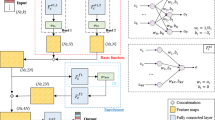Abstract
In this paper the perceptron neural networks are applied to approximate the solution of fractional optimal control problems. The necessary (and also sufficient in most cases) optimality conditions are stated in a form of fractional two-point boundary value problem. Then this problem is converted to a Volterra integral equation. By using perceptron neural network’s ability in approximating a nonlinear function, first we propose approximating functions to estimate control, state and co-state functions which they satisfy the initial or boundary conditions. The approximating functions contain neural network with unknown weights. Using an optimization approach, the weights are adjusted such that the approximating functions satisfy the optimality conditions of fractional optimal control problem. Numerical results illustrate the advantages of the method.












Similar content being viewed by others
References
Agrawal OP (2004) A general formulation and solution scheme for fractional optimal control problems. Nonlinear Dyn 38:323–337
Agrawal OP (2002) Formulation of Euler–Lagrange equations for fractional variational problems. Math Anal Appl 272:368–379
Agrawal OP (1988) General formulation for the numerical solution of optimal control problems. Int J Control 50:627–638
Agrawal OP (2008) A quadratic numerical scheme for fractional optimal control problems. J Dyn Syst Meas 130:011010
Athans M, Falb PL (2007) Optimal control an introduction to the theory and its applications. Dover Publications Inc., New York
Bazaraa MS, Sherali HD, Shetty CM (2006) Nonlinear programming: theory and algorithms, 3rd edn. Wiley, Chichester
Cybenko G (1989) Approximations by superpositions of sigmoidal functions. Math Control Signals Syst 2:303–314
Diethelm K (2010) The analysis of fractional differential equations. Springer, Berlin
Effati S, Pakdaman M (2010) Artificial neural network approach for solving fuzzy differential equations. Inf Sci 180:1434–1457
Effati S, Pakdaman M (2010) Optimal control problem via neural networks. Neural Comput Appl 23:2093–2100
Hilfer R (2000) Applications of fractional calculus in physics. World Scientific Publishing, Singapore
Khan SG, Herrmann G, Lewis FL, Pipe T, Melhuish C (2012) Reinforcement learning and optimal adaptive control: An overview and implementation examples. Annu Rev Control 36:42–59
Kilbas AA, Srivastava HM, Trujilo JJ (2006) Theory and applications of fractional differential equations. Elsevier, New York
Kirk DE (2004) Optimal control theory. Prentice-Hall Inc, Englewood Cliffs
Lagaris IE, Likas A, Fotiadis DI (1998) Artificial neural networks for solving ordinary and partial differential equations. IEEE Trans Neural Netw 9:987–1000
Lotfi A, Yousefi SA, Dehghan M (2013) Numerical solution of a class of fractional optimal control problems via the Legendre orthonormal basis combined with the operational matrix and the Gauss quadrature rule. J Comput Appl Math 250:143–160
Miller KS, Roos B (1993) An introduction to the fractional calculus and fractional differential equations. Wiley, New York
Oldham KB, Spanier J (1974) The fractional calculus. Academic Press, New York
Pakdaman M, Effati S (2015) Approximating the solution of optimal control problems by fuzzy systems. Neural Process Lett 1:1–20. doi:10.1007/s11063-015-9440-7
Podlubny I (1999) Fractional differential equations. Academic Press, New York
Pooseh S, Almeida R, Torres DFM (2014) Fractional order optimal control problems with free terminal time. J Ind Manag Optim 10:363–381
Ibrahim RW (2013) The fractional differential polynomial neural network for approximation of functions. Entropy 15:4188–4198
Sage AP, White CC III (1977) Optimum systems control. Prentice-Hall, New Jersey
Samko SG, Kilbas AA, Marichev OI (1993) Fractional integrals and derivatives: theory and applications. Gordon and Breach Science Publishers, Langhorne
Shen J, Lam J (2014) \(H_{\infty }\) model reduction for positive fractional order systems. Asian J Control 16:1–10
Shen J, Lam J (2014) State feedback \(H_{\infty }\) control of commensurate fractional-order systems. Int J Syst Sci 45:363–372
Sweilam NH, Al-Ajami TM, Hoppe HW (2013) Numerical solution of some types of fractional optimal control problems. Sci World J, pp 1–9
Vrabie D, Lewis F (2009) Neural network approach to continuous-time direct adaptive optimal control for partially unknown nonlinear systems. Neural Netw 22:237–246
Wahl H-G, Holzapfel M, Gauterin F (2014) Approximate dynamic programming methods applied to far trajectory planning in optimal control. 2014 IEEE intelligent vehicles symposium (IV), Dearborn, 8–11 June 2014
Yang X, Liu D, Wang D (2014) Reinforcement learning for adaptive optimal control of unknown continuous-time nonlinear systems with input constraints. Int J Control 87:553–566
Author information
Authors and Affiliations
Corresponding author
Ethics declarations
Conflicts of interest
The authors declare that they have no conflict of interest.
Rights and permissions
About this article
Cite this article
Javad Sabouri K., Effati, S. & Pakdaman, M. A Neural Network Approach for Solving a Class of Fractional Optimal Control Problems. Neural Process Lett 45, 59–74 (2017). https://doi.org/10.1007/s11063-016-9510-5
Published:
Issue Date:
DOI: https://doi.org/10.1007/s11063-016-9510-5



